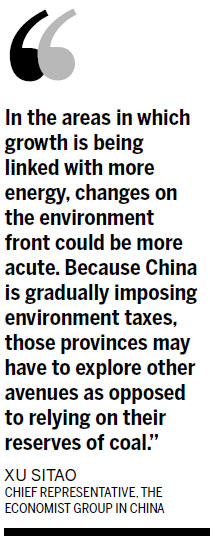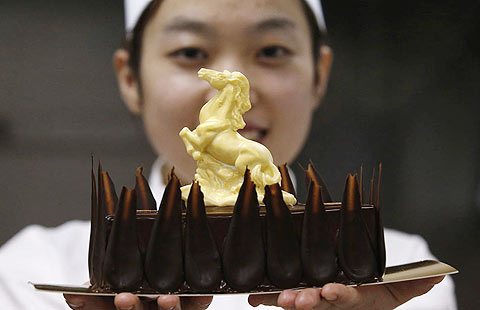Restructuring tops local agenda
Updated: 2014-01-29 08:45
By Li Jiabao and Sun Ruisheng (China Daily)
|
|||||||||||
Provinces work to deliver sustainable growth and reform, Li Jiabao and Sun Ruisheng report in Taiyuan
In recent days, the world must have been keeping a close eye on China as the world's second-largest economy posted a 7.7 percent gross domestic product growth figure for 2013, the slowest in 14 years.
Sophisticated analysts will pry into the government's restructuring of the economic growth model before assessing the likely level for this year.
Because Beijing is likely to maintain a moderate economic growth target this year, a rebalancing initiative will advance first from the central government, then outward to the provinces and other municipalities and regions.
"On the whole, China's economy grew steadily last year. The country is now at a crucial period of economic restructuring," said Ma Jiantang, head of the National Bureau of Statistics, on Jan 20.
"The momentum unleashed from the economic reforms and restructuring will be the major force supporting a steady economic growth throughout this year after the government forged a comprehensive reform blueprint late last year."
China's fast economic expansion in past decades made the nation the world's second-largest economy with the help of investment stimulus and booming exports. But sluggish international demand, and mounting government debt pressure at home, as well as the heavy smog that has blanketed the country all suggest an urgency for the leadership to steer economic growth toward domestic consumption, a policy that is believed to be more sustainable.
The 7.7 percent GDP growth last year equaled that in 2012, the slowest since 1999. Consumption contributed 50 percent of the GDP last year, while investment contributed 54.4 percent. The disparity is explained by the fact that net exports for goods and services were minus 4.4 percent, said Ma, who noted that last year, the tertiary sector, including retail sales and real estate as well as other services, exceeded the weighting of the secondary sector, including industry and the construction businesses, for the first time in three decades.
Investment still dominated growth in 2013 officially, although there is progress in balancing the various elements, said a research note by Lan Shen, Li Wei and Stephen Green, economists in China at Standard Chartered Bank.
Xu Sitao, chief representative of The Economist Group in China, said China's existing growth model is being challenged on many fronts, ranging from protectionism abroad and persistent sluggish demand from the developed world to environment concerns and an inefficient financial system.
The urgency has stemmed from the fact that certain policy leeway is slowly being eroded. For example, over-reliance on fiscal levers would increase financial sector risks, as evidenced by the ongoing jitters within the trust industry, Xu said.
China's new leadership rolled out a comprehensive reform plan to transform its growth model after the Third Plenary Session of the 18th Central Committee of the Communist Party of China in November last year. This helped boost investors' confidence.
As the global economy continues its recovery in 2014, and domestic reforms are yet to be fully advanced, China's economy will grow about 7.8 percent this year. Contributions from consumption and exports will increase, while those from investment will decline, said Tang Jianwei, a senior macroeconomic analyst at the Bank of Communications Ltd.
Provincial changes
Following the new leadership's avowed determination over reform, many provincial and municipal governments lowered this year's GDP growth targets and are focusing more on the implementation of economic restructuring. Local governments were recently busy holding their "two sessions" meetings, the most important annual event in China's political calendar at both the local and central levels, centered around lawmakers meeting at provincial people's congresses and political advisers gathering at sessions of the Chinese People's Political Consultative Conference.
Bayinchaolu, governor of Northeast China's Jilin province, predicted this year's economic growth at around 8 percent after a growth of 8.3 percent last year.
"This year marks the first year for China to fully advance the comprehensive reforms," he said. "We will focus on an innovative and green development to build an open economy while improving economic quality and efficiency," the governor said.
The province will launch a three-year program to develop its services sectors later this year, supported by key projects in modern logistics, cultural tourism and healthcare.
In the Inner Mongolia autonomous region, China's leading mineral and coal hub, the economic growth target was unchanged this year following a 9 percent growth in 2013.
"We should take advantage of the country's efforts to deal with air pollution and solve the problem of industry overcapacity and improve the development level of our industry through renovation," said Governor Bataar last week, during the region's annual people's congress. "We will encourage reshuffling our current leading industries and make coal production stable."
He said deep processing of coal products will be greatly developed. Coal-to-liquid projects with a capacity of 4.5 million metric tons, coal-to-chemicals with 2.2 million metric tons, and coal-to-gas with 20 billion metric meters will be constructed in 2014 to nurture a new and increasing economic increasing central focus.

Ma Jian, a political adviser, said during the annual political consultative conference that Inner Mongolia has great advantages in developing the cloud computing industry due to its low electricity prices, cool weather and geographic affinity to not only Beijing and Tianjin but international markets such as Russia and Mongolia.
"The development of cloud computing will upgrade traditional industries in Inner Mongolia," Ma said. "It will gather information and data related to energy, chemistry, and agriculture and animal husbandry produce processing. As a region with a wide area, public services will also find it easier relying on this platform."
In Shanxi, one of China's major coal bases, Governor Li Xiaopeng said the province will also maintain a 9 percent economic growth, unchanged from last year, but will emphasize compulsory targets of reducing energy and water costs as well as emissions of pollutants.
The governor said Shanxi will boost sustainable development of the coal industry while upgrading industries troubled with overcapacity, such as iron and steel, coking and cement, with deep processing and technological innovations.
Li also vowed to encourage emerging industries and service sectors, including heavy machinery, new materials, modern medicine, quality and quarantine inspection and testing services.
"In the areas in which growth is being linked with more energy, changes on the environment front could be more acute. Because China is gradually imposing environment taxes, those provinces may have to explore other avenues as opposed to relying on their reserves of coal," said Xu, the representative from The Economist.
The key challenge for China's successful economic restructuring is whether leaders have the commitment to confront the trade-off between economic growth and reform. Meaningful reform must entail deleveraging or a slower growth rate. Should China encounter another external shock, it would be critically important not to repeat such policy mistakes as the stimulus package in 2008, he added.
Liu Mingtai, Liu Xiao and Ding Luyang in Jilin and Wang Kaihao in Hohhot contributed to the story.
Related Stories
Carlyle 'optimistic' over restructuring of SOEs 2013-12-20 09:58
Strategic Restructuring of State-Owned Economy 2013-12-12 14:10
Shanghai top in economic restructuring 2013-12-04 16:55
China's Economy: Potential, Restructuring, Reform and Opening-up 2013-12-12 13:50
Zhangjiagang sets course for restructuring 2013-10-31 07:14
Today's Top News
Experts call for detailed H7N9 rules
HK confirms H7N9 case, to cull 20,000 poultry
Chinese President to visit Paris to boost ties
China and EU to boost political trust
US urges Japan to apologize
Int'l hacker got caught in China
More than 300 fall ill on Royal Caribbean ship
8.8% salary hikes expected for 2014
Hot Topics
Lunar probe , China growth forecasts, Emission rules get tougher, China seen through 'colored lens', International board,
Editor's Picks

|

|

|

|

|

|





